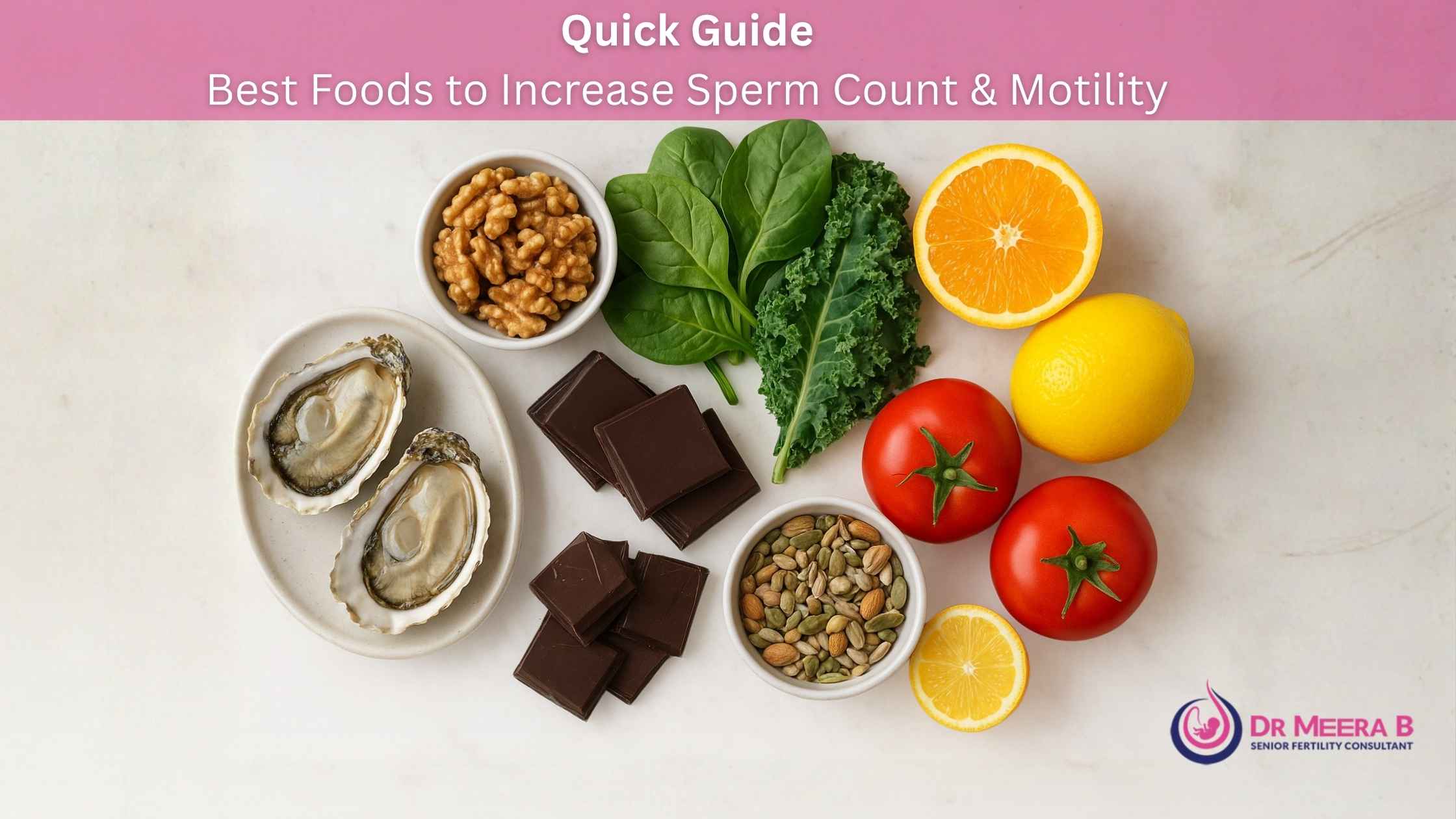Why nutrition plays a critical role in male fertility
Sperm cells are among the most metabolically active cells in the body, requiring a constant supply of nutrients and antioxidants to protect against oxidative damage. A diet rich in micronutrients supports sperm production (spermatogenesis), enhances motility, and improves overall sperm morphology. Deficiency in zinc, selenium, or vitamins like C, E, and B12 can drastically lower fertility potential. Dr Meera explains that a balanced diet not only optimizes sperm parameters but also supports hormonal balance, reducing stress-induced infertility. This is why identifying the right food increase sperm count and motility options is essential before considering invasive treatments.What foods increase sperm count and motility?
Men often ask — what foods increase sperm count and motility? The answer lies in combining nutrient-dense options across various food groups that promote reproductive health. Here’s a closer look at key examples:- Oysters and shellfish: Known for high zinc content, they boost testosterone levels and sperm production.
- Walnuts: Rich in omega-3 fatty acids, they enhance sperm vitality and membrane fluidity.
- Spinach and kale: Leafy greens provide folate, critical for healthy sperm formation.
- Dark chocolate: Contains L-arginine, an amino acid that supports sperm volume and motility.
- Tomatoes: Packed with lycopene, a powerful antioxidant proven to improve sperm structure.
- Citrus fruits: High in vitamin C, they prevent oxidative damage to sperm DNA.
- Seeds and nuts: Almonds, sunflower seeds, and pumpkin seeds are abundant in selenium and vitamin E, enhancing sperm motility and morphology.
Foods for increase sperm count and motility
To see meaningful results, men should include these foods for increase sperm count and motility in their daily meals:- Protein sources: Lean meats, fish, and eggs provide essential amino acids that support testosterone synthesis.
- Whole grains: Brown rice, quinoa, and oats supply complex carbohydrates for sustained energy production.
- Antioxidant-rich vegetables: Bell peppers, broccoli, and carrots protect sperm from oxidative stress.
- Dairy products: Milk and yogurt contain calcium and vitamin D, improving sperm motility and hormone regulation.
- Legumes and pulses: Beans and lentils offer zinc and folate that contribute to sperm count improvement.
Sperm motility increase food recommendations
When it comes to sperm motility increase food, lifestyle factors play a crucial supporting role. Foods alone cannot correct issues caused by smoking, alcohol, or sedentary habits, but they can accelerate recovery once healthy habits are adopted. Men who regularly consume pomegranate juice, avocados, and fatty fish such as salmon often experience enhanced sperm movement due to improved mitochondrial energy and antioxidant protection. Regular hydration, limited processed sugar, and reduced exposure to plastic containers also contribute to better sperm motility outcomes. Dr Meera advises maintaining a daily intake of natural sources of Coenzyme Q10, commonly found in whole grains and organ meats, to enhance sperm energy metabolism.Food for increase sperm count and motility: The essential nutrients
Each nutrient has a specific role in supporting sperm function. Here’s how they work synergistically:| Nutrient | Primary Benefit | Best Sources |
|---|---|---|
| Zinc | Increases sperm count and testosterone levels | Oysters, beef, beans |
| Selenium | Enhances sperm motility and morphology | Brazil nuts, sunflower seeds |
| Vitamin C | Protects against oxidative damage | Citrus fruits, berries, papaya |
| Folate | Improves sperm DNA quality | Leafy greens, legumes |
| CoQ10 | Boosts sperm energy and motility | Fish, poultry, whole grains |
| Omega-3 Fatty Acids | Supports sperm membrane structure | Salmon, flaxseeds, walnuts |
How soon do diet changes show results?
Since sperm production takes approximately 74 days, dietary improvements begin showing results after two to three months. Consistency in following a balanced, antioxidant-rich diet enhances overall sperm vitality. This is why it’s recommended to begin early — especially for couples planning to conceive naturally or through assisted reproductive techniques like IVF or ICSI under the supervision of specialists like Dr Meera B.How Dr Meera B helps improve male fertility
At Dr Meera B’s place of practice, male fertility assessments are integrated into couple-based fertility evaluations. Her approach combines dietary counseling, hormonal profiling, and advanced reproductive testing. She often works with nutritionists and andrologists to create personalized fertility plans focusing on sperm count foods and lifestyle optimization. Patients are guided on sustainable choices — balancing medical treatment with natural interventions. The goal is to ensure lasting fertility enhancement rather than short-term results. Many couples who adopted these changes under Dr Meera’s supervision have reported improved sperm parameters and successful conception outcomes.Lifestyle habits that support dietary improvements
To complement the impact of food for increase sperm count and motility, men should also follow these evidence-backed lifestyle measures:- Exercise moderately at least 30 minutes a day, 5 times a week.
- Avoid tight clothing and prolonged heat exposure (saunas, laptops on lap).
- Get 7–8 hours of quality sleep daily.
- Limit alcohol and avoid smoking entirely.
- Manage stress through yoga, meditation, or breathing exercises.


Comments are closed